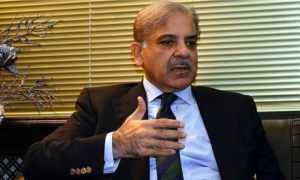The Prime Minister is in a difficult position over how to take the bitter IMF pill.
The approval of the minibudget is withheld by Shehbaz.

ISLAMABAD: On Wednesday, Prime Minister Shehbaz Sharif withheld his final approval of a series of steps Pakistan had to take to unlock the critically important International Monetary Fund (IMF) programme, directing those in charge to slightly sweeten the pill of an increase in energy prices and taxes.
From Lahore, the prime minister presided over a virtual gathering. One of the prominent conference attendees informed The Express Tribune that he also directed for measures to ensure there was less political backlash and that the people might be less burdened.
A nearly four-hour meeting that was marred by irritation with the Washington-based IMF and World Bank came to a deadlock. As the WB and IMF had also adopted a clear stance regarding Pakistan, another session will be held to bring these problems to a logical conclusion.
The vast majority of the attendees, who included cabinet ministers and important bureaucrats, believed that the IMF was the only choice left and that specific steps would need to be done.
The magnitude of these measures, specifically the amount of the tax increase and the percentage of the increase in the price of gas and electricity, were in dispute. According to the sources, there was also an agreement in principle that Pakistan would have to allow the rupee to approach the open market rate.
According to the sources, the prime minister was worried that these steps would further deplete his political capital and burden the populace. According to a senior government official, the discussions were moving toward a determination by the administration that the IMF was the only choice.
Another meeting member noted that while the current government is not to blame for the current economic problem, it must be understood that it must be addressed if a decision is to be made this week.
With barely $4.4 billion on hand right now, Pakistan’s economic condition has gotten much worse. According to highly placed sources, the most recent information revealed that Pakistan was also in violation of the IMF’s restriction to limit the central bank’s forward swaps to $4 billion by the end of December.
As opposed to the requirement to limit foreign currency swaps to $4 billion, the amount was fluctuating between $5.2 billion and $5.5 billion, and a key government official acknowledged that it would be difficult to retire the excess amount with the relatively limited reserves on hand.
According to the sources, the IMF and the World Bank were most concerned about the stringent import restrictions, currency controls, and growing exposure to short-term loans by the central bank that had put commercial banks at danger.
According to the sources, if the issue was not resolved, the banks could be taken advantage of and would not have enough money to pay the private depositors.
According to a source in the finance ministry, the external loans have stopped because net external financing for the first half of the current fiscal year was negative by almost Rs300 billion.
The World Bank and IMF have determined that Pakistan cannot be given fresh loans without first establishing consistent macroeconomic stability policies. The World Bank had previously been reported to have declined to grant two policy loans totaling $1.1 billion during the current fiscal year, according to The Express Tribune.
Some meeting attendees believed that the existing, enormous difference between interbank and open market exchange rates could not last for much longer. They noted that the choice to consult the IMF will lessen the difference between the two rates and assist prevent the dollarization of the economy.
The finance minister, however, was a strong supporter of a strong rupee, so it was unclear at first if the market-based rupee-dollar parity that the IMF had sought would still be in place.
According to the sources, there was a consensus in the discussion that petrol prices would need to go up starting this month. However, it’s possible that the Oil and Gas Regulatory Authority’s (Ogra) proposal to compel the average 74% hike from July 2022 won’t be accepted.
Pakistan promised the IMF that the circular debt would not rise at all during the current fiscal year. There were already nearly Rs 500 billion in deviations within the first four months of the fiscal year.
During the conference, it was addressed if the IMF might be asked to allow part of the impact to be passed on to consumers and allow the remaining circular debt to be added to the stock.
According to the reports, the users would be charged for any additional January excesses. They stated that the tariff would need to be raised by about Rs. 7.50 per unit if the IMF refused to permit any adjustments.
The meeting also covered a mini-budget of between Rs170 and Rs200 billion, which included a suggestion to begin raising the sales tax on petroleum items. According to a calculation, the FBR could still raise at least Rs270 billion if the mini-budget went into effect in February and a 17% GST was implemented.
According to the sources, a 1% increase in the GST will generate Rs16 billion.
The finance ministry and the power division were to create a new plan with the ability to spread out all the measures over time, per the prime minister’s instructions. But doing so would need the IMF’s approval, which was withheld until the government demonstrated its sincerity by taking action.
However, several attendees of the meeting felt that the IMF should take a break in light of the destruction caused by the floods and that the World Bank and the IMF shouldn’t take advantage of Pakistan’s precarious economic situation.










































